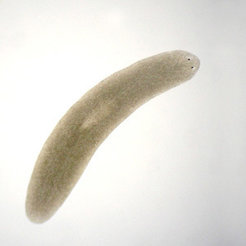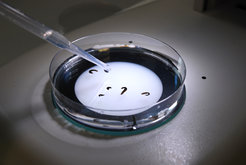Go ahead, grow a head! Understanding regeneration with planarian flatworms
Max Planck Research Group Leader Kerstin Bartscherer has been awarded a prestigious "ERC Starting Grant" by the European Research Council

Planarians are true masters of regeneration. They can replace every body part after amputation, a capacity which can be attributed to an elevated incidence of stem cells.
Some animals are true masters of regeneration: they can grow new body parts after amputation. This elevated plasticity can be attributed to the ability to recognize loss of tissue and immediately induce regeneration. Planarians are a case in point. They belong to a species of flatworms, some of which are even capable of growing an entire head, including the brain. The mechanisms, with which planarians and other animals with high plasticity react to different types of injuries by either mere wound healing or by fully replacing the missing body part, have not yet been resolved.
“If we understand how some animals activate and stabilize the regeneration process, we can draw important conclusions, which hopefully, some day will also help us to trigger regeneration also in humans”, explains Kerstin Bartscherer, Max Planck Research Group Leader at the Max Planck Institute (MPI) for Molecular Biomedicine. “For this purpose, animal models and comparative studies are indispensable. With the project subsidized by the European Research Council we intend to explore the cellular and molecular mechanisms capable of inducing regeneration of injured or missing body parts, thereby tracking blockades, which prevent successful regeneration.“

For this purpose, Kerstin Bartscherer will use planarians and zebrafish, which – contrary to humans – can quickly replace amputated body parts, without leaving scars. “The strength of our project’s approach is the unique combination of regenerative model organisms and state-of-the-art technology”, Bartscherer confirms.
The “European Research Council” (ERC) only supports highly innovative research projects pursued by distinguished top-notch researchers. “Excellent research always depends on an inspiring and supportive environment – a condition more than met in the present case. The MPI for Molecular Biomedicine maintains close collaborations with the institutes of the Westphalian Wilhelm’s University in Münster and the Cluster of Excellence research groups “Cells in Motion”, Kerstin Bartscherer praises Münster’s potential for research. The fact that Bartscherer was awarded the grant is a renewed recognition of Münster as location for European cutting-edge research on regeneration and stem cell biology. In 2015, the “European Research Council” awarded an ERC Advanced Grant for a research project on stem cell-based regeneration to the Max Planck Director Hans Schöler. In 2013, another Advanced Grant dedicated to research on blood vessels and their importance in the formation of new bone tissue went to Max Planck Director Ralf Adams. In addition, the MPI Research Group Leaders Sebastian Leidel (2012), Arndt Siekmann (2010) and Takashi Hiiragi (2007) all won one of the much-coveted ERC Starting Grants.

